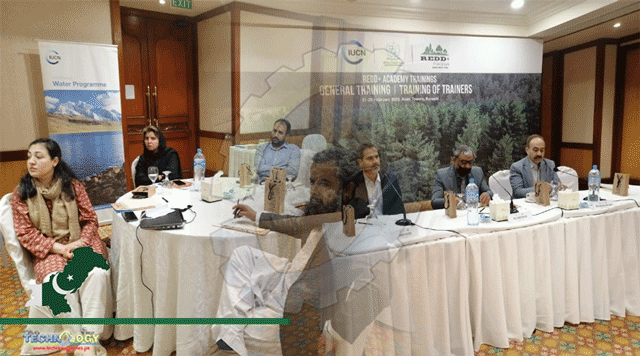Mr. Nelson Gapare, Director, Climate Change Advisory, from Madrid, was the lead trainer with extensive experience in REDD+ and forestry, including carbon credit and carbon trading.

February 21, Karachi: IUCN Pakistan commenced a five-day capacity building session for provincial forest departments on Monday, aimed at preparing them for effective engagement and formulation of bankable carbon programs and projects under the Reducing Emissions from Deforestation and Forest Degradation REDD+ Programme currently underway at the Ministry of Climate Change.
The objective of the training was to prepare the participants for effective engagement and formulation for effective engagement and formulation of bankable progrmames and projects in Pakistan to reduce impacts of climate change and reduce carbon emissions from the
forestry sector. Mr. Nelson Gapare, Director, Climate Change Advisory, from Madrid, was the lead trainer with extensive experience in REDD+ and forestry, including carbon credit and carbon trading.
In Pakistan the covered forest area is just over 5% and every year the country loses about 27,000 ha of forests. The Ministry of Climate Change through its REDD Programme initiated REDD+ activities in 2010 to mitigate climate change through reduced carbon emissions from the forestry sector.
Pakistan received a REDD+ Readiness financial support from the Forest Carbon Partnership Facility of the World Bank for readiness preparations amounting to USD 7.814 million. The REDD Programme is being implemented by the Ministry of Climate Change in collaboration with IUCN Pakistan. On this occasion keynote speaker, Mr. Riaz Wagan, Chief Conservator Forests, Sindh, lauded the achievements of the REDD National Programme towards mitigating the impacts of climate change through much need trainings and capacity of the government officials
and other stakeholders in the country. He said that “capacity building is pivotal in reducing emission from deforestation and forest degradation and achieving sustainable development in the country”
National Coordinator, REDD Programme, Syed Ghulam Qadir Shah presented the overview of the Programme. He said that considerable technical capacity exists at the national and sub-national level in various thematic areas, but additional capacity is required to operationalize the NRS and mainstreaming of REDD+ across different sector.
He mentioned of a few capacity building trainings in key relevant areas conducted throughout the country which includes: Identifying, screening and developing climate change projects; understanding REDD+ linkages between sectoral development objectives and Pakistan climate change policies, targets and action plans; accessing and engaging with international public climate finance funders, including the GCF but also co-financiers for GCF projects such as bilateral and multilateral funders; Preparation of GCF funding proposals including the GCF’s results areas and investment criteria; Enhancing inter-sector and inter-agency dialogues and coordination on climate resilience, mitigation and climate- related disaster risk reduction.
About IUCN:
IUCN, International Union for Conservation of Nature, helps the world find pragmatic solutions to our most pressing environment and development challenges. IUCN works on biodiversity, climate change, energy, human livelihoods and greening the world economy by supporting scientific research, managing field projects all over the world, and bringing governments, NGOs, the UN and companies together to develop policy, laws and best practice. IUCN is the world’s oldest and largest global environmental organization, with more than 1,400 government and NGO members and over 18,000 volunteer experts in some 160 countries. IUCN’s work is supported by over 900 staff and hundreds of partners in public, NGO and private sectors around the world.